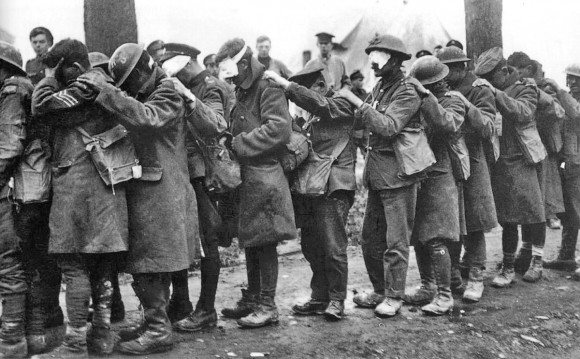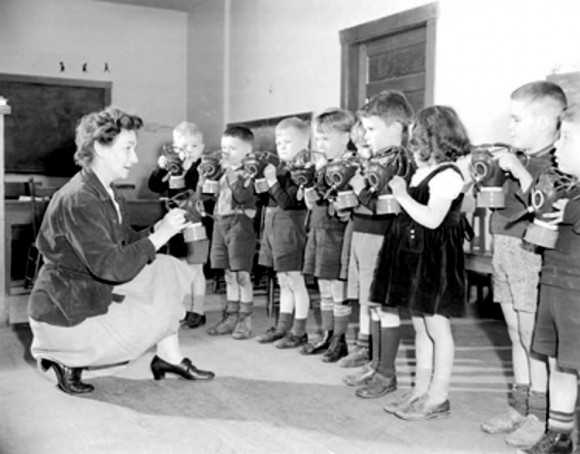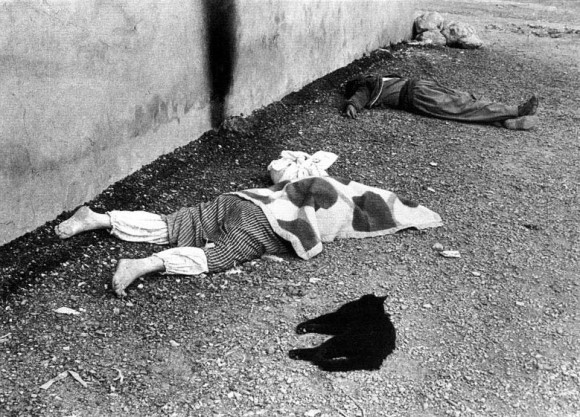aNewDomain.net commentary– The ultimate question about Syria’s alleged use of poison gas on its own citizens could not be simpler: Should the use of weapons of mass destruction on civilian non-combatants be punished?
Interesting but irrelevant questions include:
- Is American foreign policy inconsistent?
- Should the world have aided Syrian rebel groups earlier?
The answer to the ultimate question on whether a country should be punished for using WMDs on civilians is: Yes, always.
It’s somewhat ironic that our grandparents and great-grandparents had no trouble seeing the danger. Any other response to the use of WMDs on civilian populations sends a tacit message of acceptability not only to regimes of the present but to ones in the future as well.
Otherwise, the Pandora’s box world governments tried to close after World War I will begin opening wider and wider.
Chemical weapons are unacceptable.
It’s bad enough that the armed and powerful can and do shoot, starve, maim, imprison, mutilate, burn and torture civilian non-combatants.
The world’s governments have already let the Syrians down just as they have let down so many others in the past. A charity worker recently made this offer to UK Labour leader Ed Miliband who opposed British action against Syria:
I’d like to invite Ed Miliband and his family on a seven day holiday in Syria, on my expense. This is a serious offer. I’d like him to spend a day in one of the civilian areas under constant shelling, watching the warplanes above us throw all sorts of weapons onto civilians and fear for the safety of his family. Spend just one day and one night in a tent in one of the camps where the homeless now live and drink sewage water and try his luck with typhoid fever and no medication.”
Allowing the powerful to gas their opponents en masse — stamping them out like common garden pests– only propels us further down a dark hole we should be racing to close.
The world has been terrified of chemical weapons for nearly 100 years now, ever since the fighting in World War I concluded in November of 1918. These century-old fears are legitimate and justifiable.
Chemical weapons have limited military utility. That means they exist nowadays primarily to inflict casualties on civilian non-combatants — the unarmed folks who aren’t shooting at anyone. That’s usually women, children and the elderly.
Modern chemical weaponry began when the German army deployed poison gas during World War I. Germany first employed chlorine and then moved on to more exotic poisons like phosgene and mustard gas. Some of these gasses killed outright. Others disabled.
Mustard gas, for example, blisters the skin, burns the eyes and causes victims to vomit.
As for chemical weapons in general, the U.S. Army uses the phrase “dry land drownings” to describe the way chemical-attack victims die. Essentially, victims suffocate from fluids their own lungs excrete.
In 1915, during the second of several battles of Ypres, the Germans released 168 tons of chlorine gas on part of the French front line. These were colonial troops from Martinique. The soldiers who didn’t succumb to the gas fled, leaving a nearly two-mile long gap in the line.
It got worse. In World War I, all sides eventually deployed poison gas.
Shown below, British victims after a German gas attack during World War I.

Image credit: Wikimedia Commons
The world collectively shuddered at the prospect of chemical warfare by the end of World War I. Chemical warfare is and was an unjustifiable horror that has generally abated over the past 100 years.
You might notice that sci-fi films of the 1930s often feature poison gas attacks. Gas was new and scary, a horror beyond horror. There are British World War II-era films showing English parents dutifully equipping their children with gas masks. It wasn’t a propaganda stunt. The British were justifiably concerned that the Nazis would mercilessly pummel their citizens with chemical munitions expanding the battlefield use of chemical weapons to entire cities.
Fear of gas was one of the reasons why the British eventually sent their children away from London and other large cities, some going as far away as Canada. Below, see a 1939 picture of British children donning gas masks in a school drill.

Image credit: The Times
But poison gas didn’t play a major role in combat during World War II because war college studies had shown that chemical weapons during World War I produced uncertain and sometimes negative results on the battlefield. And the use of chemical weapons always produced rapid and severe retaliation in kind. It was a zero-sum game.
Poison gas only proved effective on unarmed civilians, especially civilians trapped in locked gas chamber “showers,” such as those the Nazis used to kill Jews, gypsies and others they called “undesirable” in their genocidal reign of terror.
After World War II, much of the world joined up to sign a treaty that sought to ban chemical weapons.
Every country’s war college reached an inter-war conclusion about chemical weapons. It hasn’t changed much in nearly 75 years.
Executed Iraq dictator Saddam Hussein — a former U.S. ally — used poison gas against the Iranian army during the bloody and curiously World War I-like Iran-Iraq War during the 1980s. In that struggle, some 100,000 Iranian soldiers were killed or maimed by poison gas, including some 20,000 Iranian soldiers who were killed instantly during a nerve gas attack.
Iraq might have been the only country to ever benefit militarily from poison gas. And this only worked for Iraq because many of their opponents were ill-equipped. Saddam Hussein only had to answer for the use of chemical weapons on the rebellious Kurdish village Halabja. That attack inflicted some 12,000 casualties.
Below, victims of the Iraqi gas attack on the Kurdish town of Halabja.

Source: Wikimedia Commons
And, yes, the U.S. was at least tacitly involved in Iraq’s decision to invade Iran, and it is likely complicit in the development of Iraq’s chemical weapons program. That’s the same program that caused the U.S. to invade Iraq 10 years ago. But that is old news. True, U.S. foreign policy is inconsistent. But the fact of inconsistency should not short circuit doing the right thing — in any case.
And here’s some news for swift boaters: One irony seemingly lost on U.S. conservative commentators is that the man they deigned too liberal, too weak and too ineffectual to lead the U.S. in 2004 as President is the same man leading the call to attack Syria. John Kerry opposed the Vietnam War — and he opposed it for reasons consistent with his reasons for opposing the Syrian regime’s deployment of chemical munitions. At the very least, the Secretary of State should receive credit for consistency.
In the present Syrian crisis, the world can wait for UN inspectors to analyze the samples they took in Syria.
The U.S. can wait for Congress to vote.
Speed is not of the essence in this instance.
If the UN inspectors find that chemical weapons have been used, the UN and U.S. should expend some effort to determine who deployed them. That the Syrian rebels would go to the trouble of killing nearly 1,500 of their own supporters — using costly, hard-to-obtain weapons — is a possibility, of course. But Syria, whose regime already has chemical weapons in its arsenal, is far more suspect.
The main message to communicate is the unacceptability of using chemical weapons on civilian populations.
The message needs to be more than a slap. A persistent sting delivers a minimally-acceptable message.
Syrian leader Bashar al-Assad and his cronies need to lose something they’ll dearly miss in that message — and they need to remember its loss every morning when they wake up. It doesn’t really matter much what that thing is or who delivers that message, though it likely will be the U.S.
The present Syrian regime is merely one recipient of such a message. Such a message should also be copied to any regime equally capable of doing the same thing — both now and in the future.
The message also serves as precedent and a reminder to future governments.
If the world does nothing about the gas attacks in Syria and chemical weapons used elsewhere, then WMD use just gets legitimized. Increasingly so. Governments will lose their reluctance about deploying gasses. Eventually the countries with the largest stockpiles of gas will begin using them again. And R&D funds will be spent on developing gases with new and deadlier properties.
The United States, too, will eventually be compelled to use chemical weapons again if everyone else is using them.
If I were the North Korean UN delegate, I’d think long and hard before casting a NO vote against world retaliation on Syria. In fact, I might consider leading the charge against the Syrian regime.
It’s sad to say, but punishing the Syrian regime not only sends a message to the world — but it also sends a key message to future U.S. leaders, as well.
If it can be said that in 2013 a U.S. President found the use of poison gas against a civilian population to be unacceptable, then future U.S. Presidents will have a harder time justifying a course of action that involves using WMDs.
That’s why the U.S., its allies and the United Nations need to send this message to Syria. Chemical weapons are unacceptable, period, and their use will be punished.
Our grandparents and great-grandparents had no trouble seeing this. Are we so blinded with side squabbles that it impairs our judgment?
Some commentators are so blinded by bitterness — toward the U.S., toward Obama, toward Israel, over conflicts where the world failed to intervene, over war generally, and so on — that they can’t see the big picture.
Is the big issue really that U.S. foreign policy is often inconsistent? It’s irrelevant.
Is embarrassing U.S. President Obama or U.K. Prime Minister Cameron by their domestic political opponents really more important than stopping WMD use and sending a severe message to Syria about them? No.
Should our letting other people down in other places prevent us from acting in this instance? Absolutely not.
Should a general opposition to war somehow trump trying to end one particular kind of war? No.
Were our grandparents and great-grandparents really wrong on the issue of chemical weapons — or did their first-hand experience teach them something? The latter. And we should learn from that first-hand experience, terrible as it was.
As a side issue, does it matter if, instead of Assad, a lower commander in Assad’s army gave the order to deploy gas? Absolutely not. In fact, it makes the situation worse. There should be a separate punishment for that.
If an ordinary Syrian commander has the authority to unleash tons of poison gas against a civilian population, then the Syrian regime needs a second whack for stupidly not having a solid chain of command over weapons of mass destruction.
Regarding the wider question of ending the Syrian civil war, this BBC interview with Syrian aid workers moves the theoretical suffering of war into the palpable:
Source: Hand in Hand in Syria
For aNewDomain.net commentary, I’m Tom Ewing.
Based in the U.S. and Europe, Tom Ewing is an intellectual property strategist and attorney who advises the United Nations agency WIPO on patent issues, lawsuits and strategy. He also is a senior editor and a board member at aNewDomain.net.













Comment from one of my GooglePlus followers:
NuroSlam FreeMan
9/2/2013 5:09 PM
Ill agree, the world shouldn’t. I will not agree with the need for war.
[…] Tom Ewing: Why the World Shouldn’t Tolerate Chemical Weapons Use – Ever (anewdomain.net) […]